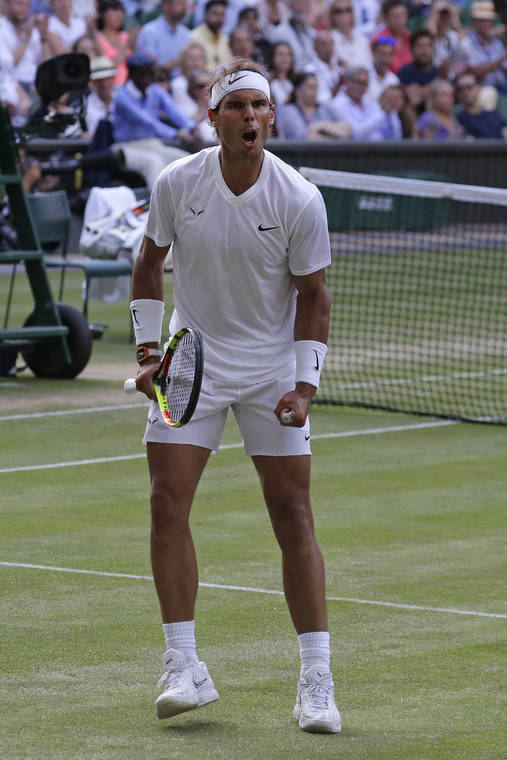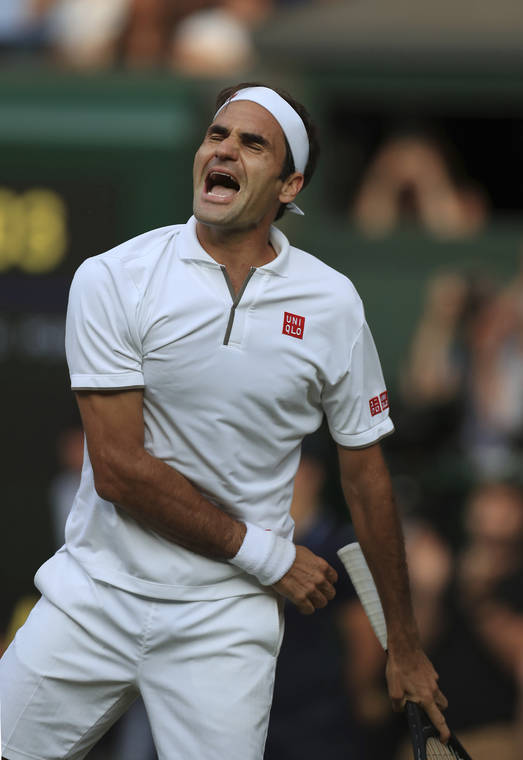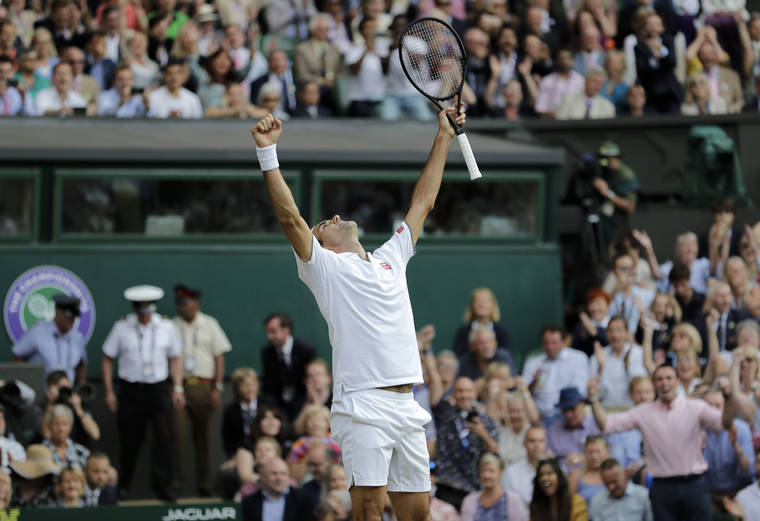WIMBLEDON, England — Roger Federer waited 11 years to get another shot at Rafael Nadal on Centre Court. This one was a semifinal, not a final. It was settled in four sets, not five.
Felt like just as much of a classic contest, though, one that anyone present is not likely to forget.
That, of course, includes Federer, who managed to pull away and beat longtime rival Nadal 7-6 (3), 1-6, 6-3, 6-4 Friday by finally coming through on his fifth match point.
“I’m exhausted. It was tough at the end,” Federer said. “Rafa played some unbelievable shots to stay in the match. I thought the match was played at a very high level.”
Federer closed in on a ninth championship at the All England Club and 21st Grand Slam trophy in all. In Sunday’s final, Federer will go up against Novak Djokovic, who is the defending champion and seeded No. 1.
Djokovic overcame Roberto Bautista Agut 6-2, 4-6, 6-3, 6-2 earlier Friday to reach his sixth Wimbledon final. Djokovic is eyeing a fifth championship at Wimbledon and 16th major title.
As entertaining Djokovic vs. Bautista Agut was — including a 45-stroke point won by Djokovic — it was merely a tasty appetizer ahead of the day’s delectable main course.
Not only was this the 40th installment of Federer vs. Nadal, but it also was their first meeting at Wimbledon since the 2008 final. Nadal won that one 9-7 in a fifth set that ended after 9 p.m., as any trace of daylight disappeared, in what some consider the greatest tennis match in the sport’s lengthy annals.
How excited, then, were the spectators for the rematch, more than a decade in the making? When Federer and Nadal strode out into the sunshine at 4:30 p.m., they were welcomed by a standing ovation before ever swinging a racket.
Quickly, that greeting was justified. These are, of course, two of the greats of all-time — maybe the two greatest — and they lived up to that status for stretches.
One key, for Federer, was that his rebuilt backhand, hit strong and flat more frequently than it used to be, held steady against Nadal’s bullwhip of a lefty forehand. Another was that he was able to withstand Nadal’s serve, which has improved a ton over the years. Federer amassed 10 break points, and though he succeeded on just two, that was enough, with the last, vital conversion making it 2-1 in the fourth set. And then there was this: Federer won 25 of the 33 points when he went to the net.
“I didn’t play well enough,” said Nadal, who lost a five-set semifinal to Djokovic a year ago.
There was something of an “Anything you can do, I can do, too” vibe to Friday’s proceedings. Federer would kick up chalk with an ace to a corner, and Nadal would do the same in the next game. When Nadal jumped out to a 3-2 lead in the first-set tiebreaker, Federer used sublime returning to reel off five points in a row to claim it.
Who else but Federer could strike a serve so well that Nadal’s framed response would end up caught by someone seated in the Royal Box, as happened early in the second set? Who else but Nadal could attack Federer’s generally unassailable forehand in such a manner as to draw one so out of character and off the mark that it landed in the third row, as happened later in that set? And who else but Nadal could somehow retrieve an apparently untouchable ball and send up a lob that Federer would shank a leaping overhead, as happened in the last game?
“I thought probably the biggest points in the match went my way. There were some tight ones and long rallies,” Federer said. “He plays with such velocity and spins and everything, you’re not always sure you’re going to connect the right way.”
No one ever has managed to reduce Federer to mid-match mediocrity quite the way Nadal can on occasion, part of why the Spaniard entered Friday with a 24-15 overall lead head-to-head, including 10-3 at Grand Slam tournaments.
The final stretch Friday must have been agonizing for Federer, who already had wasted a pair of match points when Nadal served at 5-3. At 5-4, Nadal held a break point but let it slip away when he netted a backhand, then bent over and put his hands on his head, exasperation personified.
Federer’s third match point — as his wife, Mirka, peeked through fingers covering her face — was a 24-stroke masterpiece that Nadal took with an inside-out forehand winner. The fourth was saved with a cross-court backhand. But when the fifth opportunity to close it out arrived after 3 hours, 2 minutes, Federer saw Nadal push a backhand long.
This was the second major in a row where they’ve faced off: Nadal won their windy French Open semifinal last month en route to his 12th championship on the red clay there. But Wimbledon is Federer’s dominion. He’s won 101 matches at the place — more than any other man at any other Slam, even Nadal at Roland Garros — and all of those trophies.
Earlier, Djokovic watched the 23rd-seeded Bautista Agut’s shot hit the net tape, pop in the air and slide over for a winner that tied their semifinal at a set apiece. Walking to his changeover chair, as fans roared with approval, Djokovic nodded and waved his racket, then his right hand, at the crowd, sarcastically encouraging folks to get louder, as if to say, “Yeah, good for him and good for you. Enjoy it while you can.”
Soon enough, he was ending that 45-stroke point — the longest on record at Wimbledon, where such stats date to 2006 — with a backhand winner to save a break point, then cupping his ear while glaring into the stands.
“I had to dig deep,” Djokovic said.
His match was his 36th career appearance in the final four at a major tournament — and the debut in that round for Bautista Agut.
Even Bautista Agut didn’t really expect his visit to the All England Club to last this long: The Spaniard was supposed to meet a half-dozen of his buddies on the island of Ibiza this weekend for his bachelor party. Instead, those pals were sitting in a guest box at Centre Court on Friday.
Eventually, Djokovic took control with his enviable ability to return serves, track down balls and go from defense to offense.
Now he’s Federer’s problem.
“I hope I can push him to the brink and hopefully beat him. But it’s going to be very difficult, as we know,” Federer said. “He’s not No. 1 just by chance.”
———
More AP tennis coverage: https://www.apnews.com/apf-Tennis and https://twitter.com/AP—Sports





